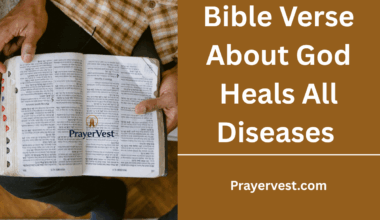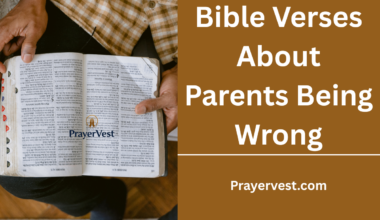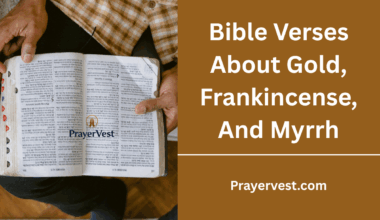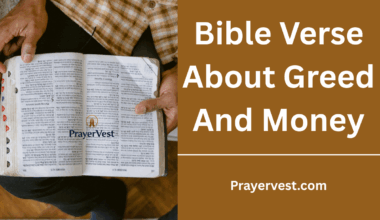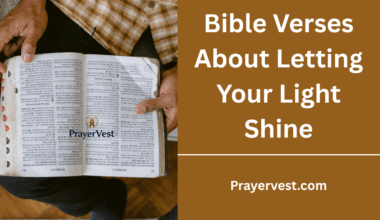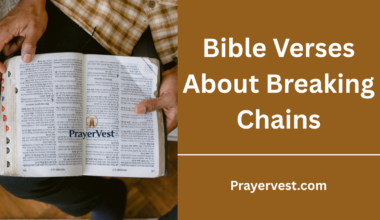Although evil frequently seems to flourish for a while, Scripture tells us that wickedness always contains the seed of unrest. More than just a saying, “no rest for the wicked” is a biblical truth based on the spiritual rule that sin causes chaos.
The Bible makes clear that those who rebel against God never find true peace, a calm conscience, or a haven from their inner suffering. Even if the wicked may become wealthy or powerful, the emptiness that only God can satisfy will always torment their restless spirits.
The agitation of the immoral and the tranquility of the pious are contrasted clearly throughout the Bible. The wicked are compared to the “troubled sea” that is incapable of remaining motionless, but those who walk in obedience live in peace and safety under God’s watch. Anxiety, dread, and discontent swirl in their hearts.
This is the inevitable result of being cut off from God, the source of true serenity; it is not just divine punishment. The deeper lack of reconciliation with the Creator is reflected in the absence of rest.
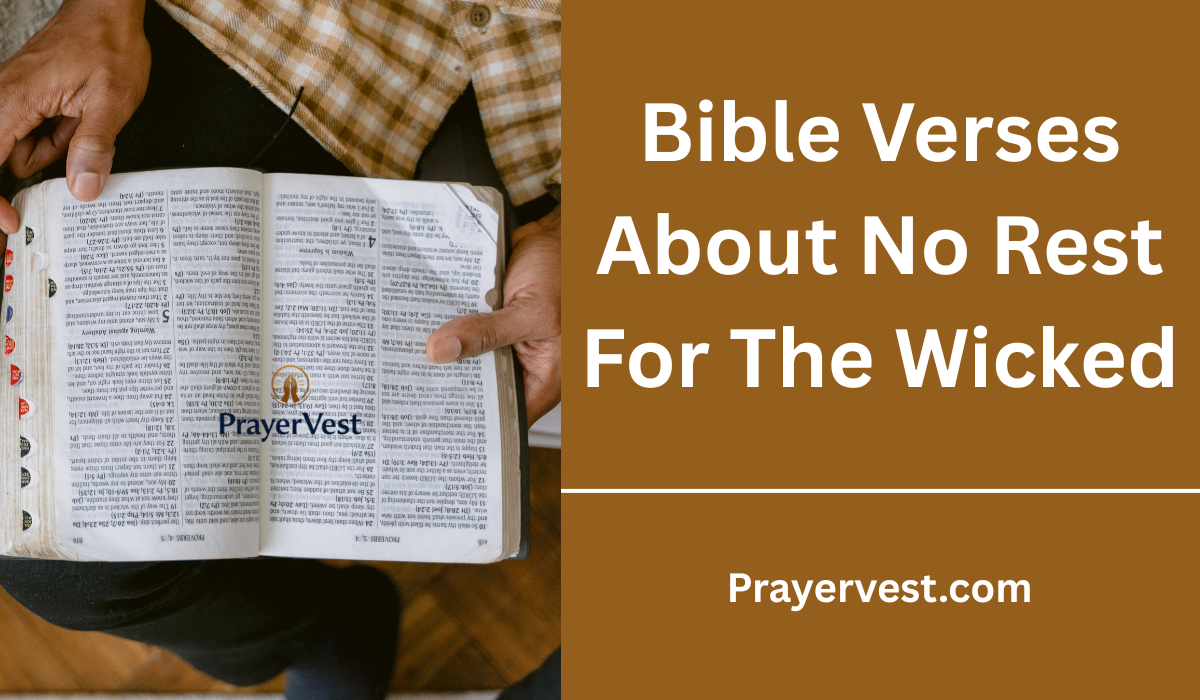

Studying “No Rest for the Wicked” through the Bible helps us comprehend God’s judgment and mercy. These verses serve as a reminder that sin upsets both our internal balance and our relationships with others. Nevertheless, these cautions contain a call to repentance—a divine invitation to move from rebellion to rest, from turmoil to peace. The promise of peace is restored to those who humble themselves and turn back to God. As we study these Bible passages, may we understand that genuine rest comes from being in harmony with God’s heart, who alone bestows perfect peace on people who put their trust in Him, rather than from comfort or indulgence.
40 Inspiring Bible Verses About No Rest For The Wicked (2026)
1. Isaiah 48:22
“There is no peace,” says the Lord, “for the wicked.”
This definitive declaration from Isaiah captures the spiritual unrest that plagues those who rebel against God’s ways. Despite outward prosperity or power, the wicked find no inner calm because they are separated from the source of true peace—God Himself. Their pursuits lead only to emptiness and turmoil. This verse reminds us that peace is not the absence of conflict but the presence of righteousness. When we choose rebellion over obedience, we forfeit the serenity that only comes through alignment with God’s truth.
2. Isaiah 57:20-21
“But the wicked are like the tossing sea, which cannot rest, whose waves cast up mire and mud. ‘There is no peace,’ says my God, ‘for the wicked.’”
Isaiah’s vivid imagery portrays the wicked as a restless sea—constantly churning, never still, and perpetually stirring up filth. This symbolizes the moral and spiritual turbulence of those who reject God. Their hearts are unstable, their consciences troubled, and their pursuits unfulfilled. The absence of peace is not merely punishment but the natural consequence of a life disconnected from divine order.
3. Proverbs 4:16
“For they cannot rest until they do evil; they are robbed of sleep till they make someone stumble.”
This proverb exposes the compulsion that drives the wicked—their restlessness stems from a heart enslaved by sin. Evil becomes their sustenance, and wrongdoing their satisfaction. The verse warns believers of the destructive pattern of wickedness: sin does not satisfy but enslaves. The inability to rest is both a symptom and a judgment—a life consumed by darkness can never find true stillness.
4. Job 15:20
“All his days the wicked man suffers torment, the ruthless man through all the years stored up for him.”
Eliphaz’s words reflect an enduring truth: the wicked live under a shadow of inner torment. Though they may outwardly thrive, their conscience gnaws at them. The fear of judgment and the weight of guilt accompany them through life. This verse highlights the internal suffering that follows sin—a suffering that only repentance and grace can heal.
5. Psalm 37:10
“A little while, and the wicked will be no more; though you look for them, they will not be found.”
David’s psalm reassures believers that the apparent success of the wicked is temporary. Their restlessness and rebellion ultimately lead to their downfall. God’s justice, though patient, is certain. This verse calls us to wait in faith, knowing that peace belongs to the righteous while turmoil consumes those who reject God’s ways.
6. Proverbs 11:8
“The righteous person is rescued from trouble, and it falls on the wicked instead.”
This proverb contrasts the destinies of the righteous and the wicked. While the righteous find deliverance and peace, the wicked inherit the very troubles they sought to escape. Their restlessness draws calamity upon themselves, turning their schemes into snares. This verse emphasizes divine justice—evil may seem strong for a season, but it eventually collapses under its own weight.
7. Psalm 7:15-16
“He makes a pit, digging it out, and falls into the hole that he has made. His mischief returns upon his own head, and on his own skull his violence descends.”
The psalmist vividly describes how wickedness is self-destructive. Those who plot evil ultimately fall into their own traps. This restlessness and lack of peace stem from a cycle of sin that consumes itself. The verse reminds us that evil cannot sustain life—it only multiplies unrest until it destroys its maker.
8. Ecclesiastes 8:13
“Yet because the wicked do not fear God, it will not go well with them, and their days will not lengthen like a shadow.”
Solomon, reflecting on divine justice, concludes that the wicked cannot escape the consequences of their irreverence. Though they may live comfortably for a time, their peace is counterfeit. Without reverence for God, their lives lack stability, purpose, and eternal rest. True rest, he reminds us, is inseparable from godly fear.
9. Psalm 73:18-19
“Surely you place them on slippery ground; you cast them down to ruin. How suddenly are they destroyed, completely swept away by terrors!”
The psalmist Asaph acknowledges his envy of the wicked’s prosperity but later realizes their end—instability, ruin, and terror. Their seeming rest is fragile and fleeting. God’s justice ensures that their peace is an illusion. This verse teaches that rest apart from God is temporary and deceptive, leading inevitably to downfall.
10. Romans 2:8-9
“But for those who are self-seeking and who reject the truth and follow evil, there will be wrath and anger. There will be trouble and distress for every human being who does evil.”
Paul affirms that rebellion against God results in restlessness, distress, and divine wrath. Those who reject the truth cannot experience inner peace because they resist the very source of it. This passage bridges the Old and New Testaments, underscoring that the absence of rest for the wicked is not just poetic justice—it is a moral law embedded in God’s order.
11. Psalm 9:15-16
“The nations have fallen into the pit they have dug; their feet are caught in the net they have hidden. The Lord is known by his acts of justice; the wicked are ensnared by the work of their hands.”
This psalm declares the inescapable justice of God. The wicked, in their deceitful schemes, entrap themselves through their own evil. Their lack of rest is a reflection of divine retribution—they labor for destruction, only to find that destruction circles back upon them. The Lord’s justice exposes the futility of wickedness and the peace found only in righteousness.
12. Psalm 36:1-2
“I have a message from God in my heart concerning the sinfulness of the wicked: There is no fear of God before their eyes. In their own eyes they flatter themselves too much to detect or hate their sin.”
David reveals the internal blindness of the wicked. Their restlessness stems from self-deception and the absence of godly fear. They are caught in cycles of sin because they cannot see or despise their wrongdoing. The verse teaches that spiritual unrest begins when we lose the fear of God—peace departs when pride blinds the soul.
13. Psalm 10:4
“In his pride the wicked man does not seek him; in all his thoughts there is no room for God.”
This verse exposes the root of the wicked’s turmoil—pride. When the human heart removes God from its thoughts, it replaces divine peace with chaos. The wicked man’s self-sufficiency is his undoing, leaving him restless and spiritually hollow. The absence of God creates a vacuum that no earthly pursuit can fill.
14. Proverbs 21:7
“The violence of the wicked will drag them away, for they refuse to do what is right.”
The wicked are consumed by their own brutality. Their refusal to turn from evil leads to self-destruction. This verse demonstrates that wickedness is a force that cannot stand still—it drags, devours, and destabilizes. There is no peace because there is no alignment with righteousness.
15. Psalm 11:5-6
“The Lord examines the righteous, but the wicked, those who love violence, he hates with a passion. On the wicked he will rain fiery coals and burning sulfur; a scorching wind will be their lot.”
This passage illustrates the outcome of unrepentant wickedness—judgment and ruin. The imagery of burning wind and sulfur symbolizes divine wrath and inner unrest. The wicked are deprived of peace because their rebellion provokes the justice of God, who tests every heart and acts righteously.
16. Psalm 37:35-36
“I have seen a wicked and ruthless man flourishing like a luxuriant native tree, but he soon passed away and was no more; though I looked for him, he could not be found.”
David’s wisdom reflects the transient nature of wicked success. Even when they appear rooted and thriving, the wicked soon vanish. Their peace is false, their foundation unstable. This verse assures believers that wickedness never endures—it withers before the steady light of God’s justice.
17. Proverbs 14:32
“When calamity comes, the wicked are brought down, but even in death the righteous seek refuge in God.”
The wicked have no rest even in death, for their lives lacked reconciliation with God. In contrast, the righteous find eternal peace. This proverb teaches that rest cannot be found outside divine refuge—true peace is eternal, not circumstantial.
18. Psalm 1:4-5
“Not so the wicked! They are like chaff that the wind blows away. Therefore the wicked will not stand in the judgment, nor sinners in the assembly of the righteous.”
The image of chaff highlights the instability and worthlessness of the wicked. Blown about by every wind, they lack the rooted peace of the righteous. Their lives are marked by spiritual turbulence and ultimate separation from God’s presence.
19. Job 18:5-6
“The lamp of a wicked man is snuffed out; the flame of his fire stops burning. The light in his tent becomes dark; the lamp beside him goes out.”
Bildad’s observation captures the extinguishing of the wicked’s influence and vitality. Their inner light—symbolizing hope, joy, and rest—is darkened. Wickedness consumes itself until nothing but spiritual darkness remains.
20. Psalm 112:10
“The wicked will see and be vexed, they will gnash their teeth and waste away; the longings of the wicked will come to nothing.”
This verse reflects the frustration of the wicked as they witness the prosperity of the righteous. Their desires, rooted in envy and greed, end in emptiness. Rest eludes them because they chase vanity instead of virtue.
21. Proverbs 10:28
“The prospect of the righteous is joy, but the hopes of the wicked come to nothing.”
The wicked live in constant disappointment, as their ambitions collapse under moral decay. Their lack of rest flows from misplaced hope—anchored in temporary things that cannot satisfy. True rest is found in eternal hope, not fleeting gain.
22. Psalm 94:3-4
“How long, Lord, will the wicked, how long will the wicked be jubilant? They pour out arrogant words; all the evildoers are full of boasting.”
The psalmist laments the temporary triumph of the wicked, whose arrogance blinds them to judgment. Their rest is shallow and short-lived. Their boasting conceals insecurity, for the peace of the wicked is an illusion awaiting divine correction.
23. Psalm 125:5
“But those who turn to crooked ways the Lord will banish with the evildoers. Peace be on Israel.”
God’s separation of the wicked from the righteous emphasizes that peace belongs only to those who walk uprightly. The wicked are excluded from divine rest because they reject God’s covenant path. This verse draws a clear line between peace through righteousness and turmoil through disobedience.
24. Proverbs 24:19-20
“Do not fret because of evildoers or be envious of the wicked, for the evildoer has no future hope, and the lamp of the wicked will be snuffed out.”
Solomon advises against envying the wicked’s temporary prosperity. Their apparent rest will be extinguished. Their future holds no peace because they are estranged from the source of eternal light. The righteous, meanwhile, inherit a lasting calm rooted in divine trust.
25. Psalm 5:4-5
“For you are not a God who is pleased with wickedness; with you, evil people are not welcome. The arrogant cannot stand in your presence. You hate all who do wrong.”
This verse reveals that wickedness and rest cannot coexist in God’s presence. Evil alienates individuals from divine fellowship, which is the foundation of peace. The wicked experience restlessness because separation from God brings spiritual isolation.
26. Job 27:19-20
“He lies down wealthy, but will do so no more; when he opens his eyes, all is gone. Terrors overtake him like a flood; a tempest snatches him away in the night.”
Job observes the fleeting comfort of the wicked. Their riches cannot preserve them from divine reckoning. Their nights, once restful, become haunted by fear. The imagery of storms and floods mirrors their inner chaos—judgment overtakes them in their restlessness.
27. Psalm 140:11
“Let slanderers not be established in the land; may disaster hunt down the violent.”
The psalmist prays that evil will not find stability or rest. The wicked, pursued by the consequences of their deeds, live under the shadow of inevitable justice. Their restlessness is both their punishment and their exposure before God’s righteousness.
28. Proverbs 15:29
“The Lord is far from the wicked, but he hears the prayer of the righteous.”
Distance from God is the ultimate cause of the wicked’s unrest. Without access to divine communication, they wander in spiritual silence and isolation. This separation breeds turmoil, while the righteous, through prayer, find rest in God’s nearness.
29. Psalm 75:8
“In the hand of the Lord is a cup full of foaming wine mixed with spices; he pours it out, and all the wicked of the earth drink it down to its very dregs.”
The cup symbolizes divine wrath—an image of the inescapable judgment awaiting the wicked. Their rest is destroyed by the bitterness of their choices. What they once pursued in defiance returns as the cause of their downfall. God’s justice ensures no peace for those who persist in evil.
30. Psalm 34:21
“Evil will slay the wicked; the foes of the righteous will be condemned.”
This verse portrays evil as self-destructive. The wicked are consumed by the very evil they perpetrate. Their lack of rest is inherent in their rebellion—wickedness devours its own. The righteous, however, rest secure in divine protection and vindication.
31. Proverbs 12:21
“No harm overtakes the righteous, but the wicked have their fill of trouble.”
This proverb emphasizes the spiritual divide between those who walk with God and those who defy Him. The righteous may face trials, yet they experience an underlying peace and protection that sustains them. The wicked, however, live under the constant weight of turmoil—trouble follows them because their choices invite instability and moral decay. Their “fill of trouble” is not random misfortune but the natural outflow of rebellion against divine order. It reveals that peace is not the absence of hardship but the fruit of living rightly before God.
32. Job 20:5
“The mirth of the wicked is brief, the joy of the godless lasts but a moment.”
Zophar’s statement captures a timeless truth—the wicked may rejoice, but their happiness is shallow and short-lived. Their joy lacks foundation, built on the shifting sands of deceit and pride. What appears to be delight is often a distraction from inner emptiness. Without repentance, the wicked cannot sustain joy because true rest and peace stem only from righteousness. God allows temporary prosperity for the wicked to reveal that, without Him, pleasure quickly dissolves into weariness and regret.
33. Psalm 28:4-5
“Repay them for their deeds and for their evil work; repay them for what their hands have done and bring back on them what they deserve. Because they have no regard for the deeds of the Lord and what his hands have done, he will tear them down and never build them up again.”
Here, David pleads for divine justice, underscoring that the wicked’s downfall is rooted in their disregard for God’s works. Their restlessness is a byproduct of their arrogance—they neither acknowledge God’s hand in creation nor honor His authority. The tearing down of the wicked is not arbitrary; it is the natural unraveling of a life built on rebellion. Peace is a divine reward for humility and reverence, but the wicked’s disregard leaves them spiritually bankrupt and perpetually unsettled.
34. Proverbs 28:1
“The wicked flee though no one pursues, but the righteous are as bold as a lion.”
This striking contrast captures the torment of a guilty conscience. The wicked live in paranoia, haunted by their own deeds and plagued by inner fear even in moments of calm. Their restlessness is psychological as well as spiritual—evil leaves them unable to trust, unable to be still. The righteous, however, anchored in integrity and faith, experience boldness and tranquility. This verse reminds us that peace is a byproduct of moral clarity, while guilt breeds ceaseless agitation.
35. Job 20:5
“The mirth of the wicked is brief, the joy of the godless lasts but a moment.”
Zophar’s observation speaks to the fleeting nature of ungodly pleasure. The wicked may revel for a time, but their joy is shallow and short-lived. The pleasures of sin promise satisfaction but deliver restlessness and decay. This verse exposes the emptiness of worldly indulgence—it can never fill the void that only divine peace satisfies. The wicked’s laughter fades quickly because it is not rooted in truth or righteousness.
36. Psalm 119:155
“Salvation is far from the wicked, for they do not seek out your decrees.”
The distance between the wicked and peace is measured by their distance from God’s Word. Refusing divine instruction, they wander without direction, unable to find rest. Salvation—true peace and restoration—is inaccessible to those who reject God’s guidance. The verse teaches that inner peace flows from obedience to Scripture; disobedience leaves the soul adrift and disquieted. The Word of God is both anchor and compass for the weary heart.
37. Proverbs 11:5
“The righteousness of the blameless makes their paths straight, but the wicked are brought down by their own wickedness.”
The wicked trip over the snares of their own making. Every dishonest act and deceitful plan creates instability and confusion. This proverb reveals that wickedness is self-defeating—it builds the very obstacles that cause one’s fall. The righteous, guided by moral clarity, walk in peace because their paths are illuminated by truth. Wickedness, by contrast, leads only to anxiety and collapse, ensuring that peace remains forever beyond its grasp.
38. Psalm 146:9
“The Lord watches over the foreigner and sustains the fatherless and the widow, but he frustrates the ways of the wicked.”
This verse highlights God’s moral order in society. The oppressed, the vulnerable, and the humble find protection under His watchful care, while the schemes of the wicked are constantly frustrated. Every attempt at self-serving ambition is met with divine resistance. The restlessness of the wicked stems from divine opposition—they labor in vain against a justice that cannot be overthrown. God’s care for the humble stands as a direct contrast to His hindrance of the proud.
39. Malachi 4:1
“Surely the day is coming; it will burn like a furnace. All the arrogant and every evildoer will be stubble, and the day that is coming will set them on fire,” says the Lord Almighty. “Not a root or a branch will be left to them.”
Malachi’s prophecy presents a vivid picture of divine judgment—a day when the wicked, symbolized as dry stubble, will be consumed by God’s righteous fire. This image goes beyond physical destruction; it represents the total eradication of evil and the unrest that it breeds. The wicked, who once appeared untouchable, will find themselves stripped of power, position, and even memory. Their inability to find peace is not only an earthly experience but an eternal reality.
40. Revelation 14:11
“And the smoke of their torment will rise forever and ever. There will be no rest day or night for those who worship the beast and its image, or for anyone who receives the mark of its name.”
John’s Revelation brings the concept of “no rest for the wicked” to its eternal conclusion. Those who reject God and align themselves with evil experience perpetual unrest—not just in life, but in eternity. The “smoke of their torment” symbolizes the unending consequences of rebellion against God’s holiness. This verse is not merely about punishment but about the eternal separation from the peace found in God’s presence.
Conclusion
Scripture makes it quite evident that wickedness and peace are incompatible. People who reject God eventually become caught in vicious cycles of unhappiness, worry, and unrest. Sin isolates the soul from the very source of calm, making the lack of divine peace a spiritual reality rather than just a punishment. The adage “no rest for the wicked” serves as a warning and a revelation: without God’s presence, the human heart cannot find peace. No amount of success, enjoyment, or material wealth will ease the inward torment caused by sin.
Yet even amid heavenly warnings, God’s mercy pours through. The same verses in the Bible that proclaim judgment also provide hope for salvation. Everyone who turns to Christ in faith and repentance is promised rest. “Come to me, all you who are weary and burdened, and I will give you rest,” says Jesus Himself. The contrast between the wicked and the righteous serves as a reminder that true peace is something that is freely provided by the One who calms the inner tempest rather than something that must be earned. The tired finally find rest in Him, and the restless find rebirth.

